(note: this article originally posted in 2011 and has been updated)
Don’t Believe Everything You Read on the Internet – Go to Trusted Sources
If you’ve ever worried about finding gluten free medications, you’ll appreciate my concern when an urgent email came out in all caps with a rarely-used triple exclamation point in the subject line. The email: “ROBITUSSIN NOW CONTAINS GLUTEN!”
That was it. No details, no source. And it didn’t just go to me — it went to a huge celiac support group list.
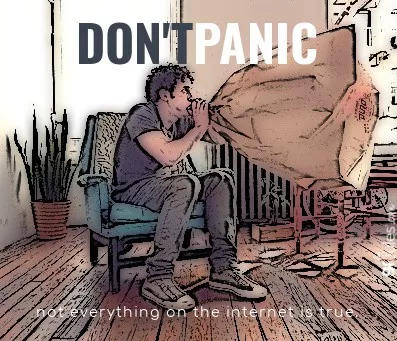
These kinds of alerts and warnings are broadcast on our celiac listservs, posted on Twitter and Facebook, and shared in emails and support group meetings all the time.
Unfortunately, that’s often our community’s best means of protection. Also unfortunately, these urgent messages are often false and lead to gluten free panic attacks.
(The converse of that is also true: there was a post on Twitter recently that envelope glue in the US no longer contains gluten; this fact has been true for years, but it caused panic in folks who never knew there used to be gluten in envelope glue, and wondered what else they didn’t know!).
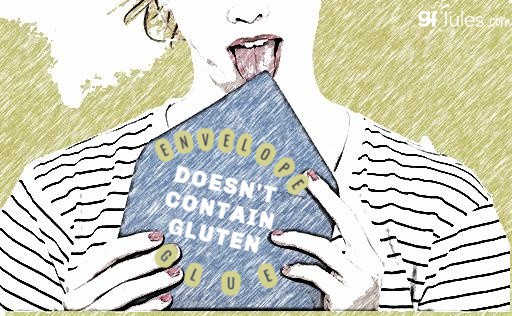
This warning had me on my heels though, since my go-to list of gluten free medications didn’t indicate that any Robitussin medications contain gluten. So, I did what I always do when I have a product question: I went right to the source (and so should you!). In this case, I called Pfizer, the maker of Robitussin (their toll-free number is on the website).
The answer I got in 2011 was different from the answer I got when I checked again in 2016. Previously, I had been told that THREE of the Robitussin varieties contained added gluten; the remaining products were not tested to determine whether they were gluten-free, but there was no gluten in their ingredients.
I had also earlier reached out to Steve Plogsted — a clinical pharmacist at Nationwide Children’s Hospital and professor of pharmacy, and THE resident expert on gluten in pharmaceuticals and over-the-counter medications (now retired) — to see his take on all this ingredient confusion. Plogsted was out of the country when this story broke, but called Pfizer himself upon his return. This is what Plogsted told me about his 2011 conversation with Pfizer (quoted with permission):
I just spoke with the company and they are now saying that the only Robitussin product that contains gluten is the Maximum Strength Cough and Chest Congestion DM and the source of that gluten is corn. They said that they are not allowed to separate (in their response) the source of gluten. They are aware that corn gluten is OK and wheat is not but to them, gluten is gluten.
There are no glutens in syrups so this whole deal is just crazy in my opinion. This is the same company who has told me that 8 or so of their prescription products contain gluten which they don’t; they contain the sugar alcohols.
In 2016, whether because of formula changes or due to a better understanding of gluten, the company now says that they do not add gluten to any of their Robitussin products, but that they also do not test to ensure the products are gluten free.
As of 2021 … at least some Robitussin products now bear a gluten free label. Not certified gluten free, but proactively identified by the company as being gluten free. Again, not all of their products, but some.
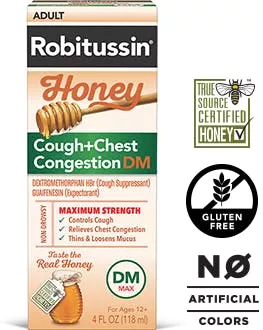
Other random surprises? As of 2017, Dimetapp Tabs and Bufferin Regular 325s contained gluten (always check with the manufacturer to be sure).
Gluten in Medications Update:
Although the FDA has issued draft guidance for drug manufacturers, it is entirely voluntary at this time.
Because the Gluten in Medicine Disclosure Act originally introduced by Representative Tim Ryan and others in 2013 (and re-introduced in subsequent years) has not yet passed, there is no federal law requiring that gluten ingredients be called out specifically on medications.
Should this legislation pass, drug manufacturers would be required to label medications intended for human consumption with the list of ingredients and their source, as well as whether gluten is present. A gluten-containing drug that fails to meet these requirements would be deemed “misbranded” under Section 502 of the Federal Food, Drug, and Cosmetic Act.
This regulation would primarily identify the starches in prescription drugs which may be derived from wheat or from corn, but currently, consumers are left to wonder as to their origins. Note as well that brand name and generic drugs may differ completely in their inactive starch content and potential for cross-contact.
Read ingredient labels where possible, or ask your pharmacist to screen for any ingredients with the following names and identify the source:
- Pregelatinized starches
- Sodium starch glycolate
- Dextrins
- Dextrose
- Maltodextrin
- Cyclodextrins
- Any ingredient that contains the word “starch”
While identifying inactive ingredients in medications may seem a trivial task for many, for the nearly 3 million Americans with celiac disease, the 18 million more with severe gluten sensitivity, and the countless others living with medical conditions requiring a gluten-free diet, it is critical that every source of gluten be identified.
To read more about this proposed legislation — re-introduced in 2021 — and to urge your representatives to sign on, contact your congressmen and women through this form supplied by the Celiac Disease Foundation.
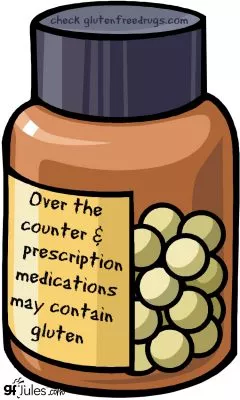
So … How do I Know if There is Gluten in My Medication?
- Don’t jump to conclusions and panic over everything you hear or read about gluten. That being said, if you’re unsure, don’t take a chance.
- Use the resources available to you: trusted books or internet sources, physicians, experts.
- If ever in doubt, call the customer service number for any brand or product — that’s why it’s there.
- When it comes to pharmaceuticals, ask your pharmacist to confirm the gluten-free status of all your prescriptions. They’ll follow up with the manufacturers on your behalf, and inquire about starches and other excipients (ingredients) used in the formulations.
- Share the information you learn with others in a reasonable manner that informs rather than scares.
- Check the list at GlutenFreeDrugs.com (note: last updated 4/28/17)
If you would like to learn more about gluten in pharmaceuticals and over-the-counter medications, go to:
The First Year: Celiac Disease & Living Gluten Free (2008 Da Capo Press)
Steven Plogsted, “Medications and Celiac Disease — Tips from a Pharmacist,” Practical Gastroenterology (January 2007): 58-64, The Celiac Diet, Series #5, Carol Rees Parrish, ed.
GlutenFreeDrugs (list of medications – last updated 4/28/17)
Pharmacy Times: Gluten Content of the Top 200 Medications (published 2016)
NFCA: Gluten in Medications for Patients
In what medication — over the counter or prescription — have you actually found gluten? Please share and keep others safe!


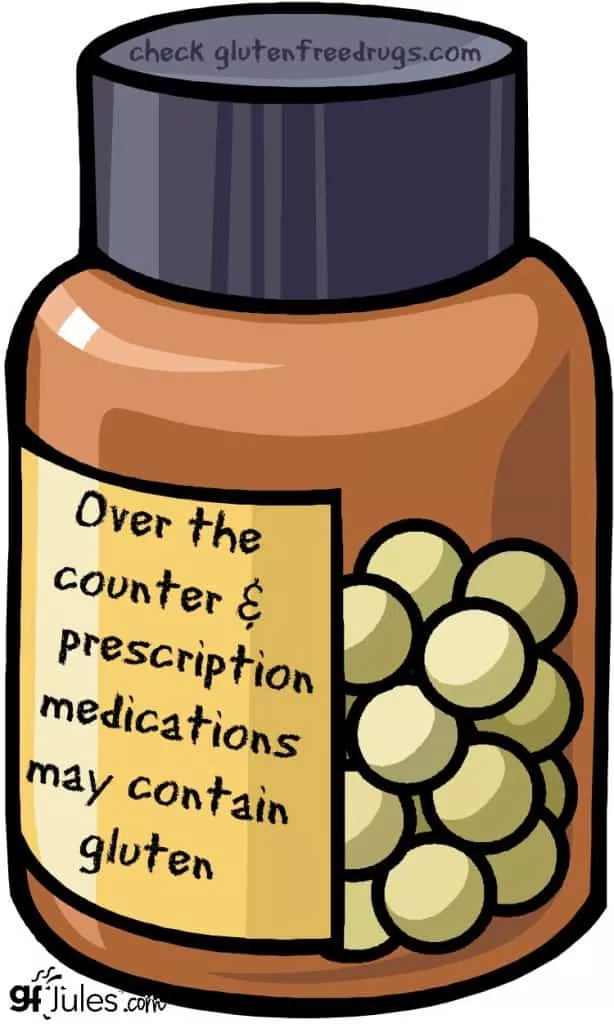
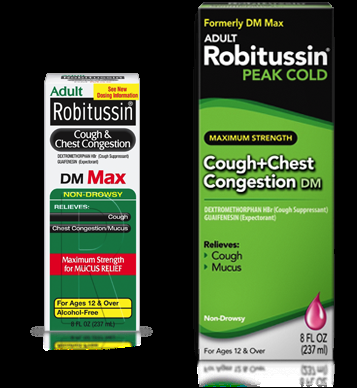





 (3 votes, average: 4.33 out of 5)
(3 votes, average: 4.33 out of 5)










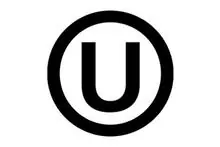
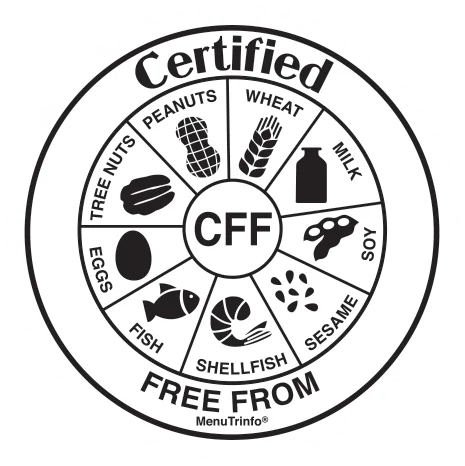
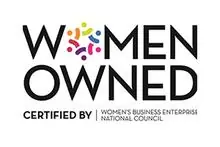
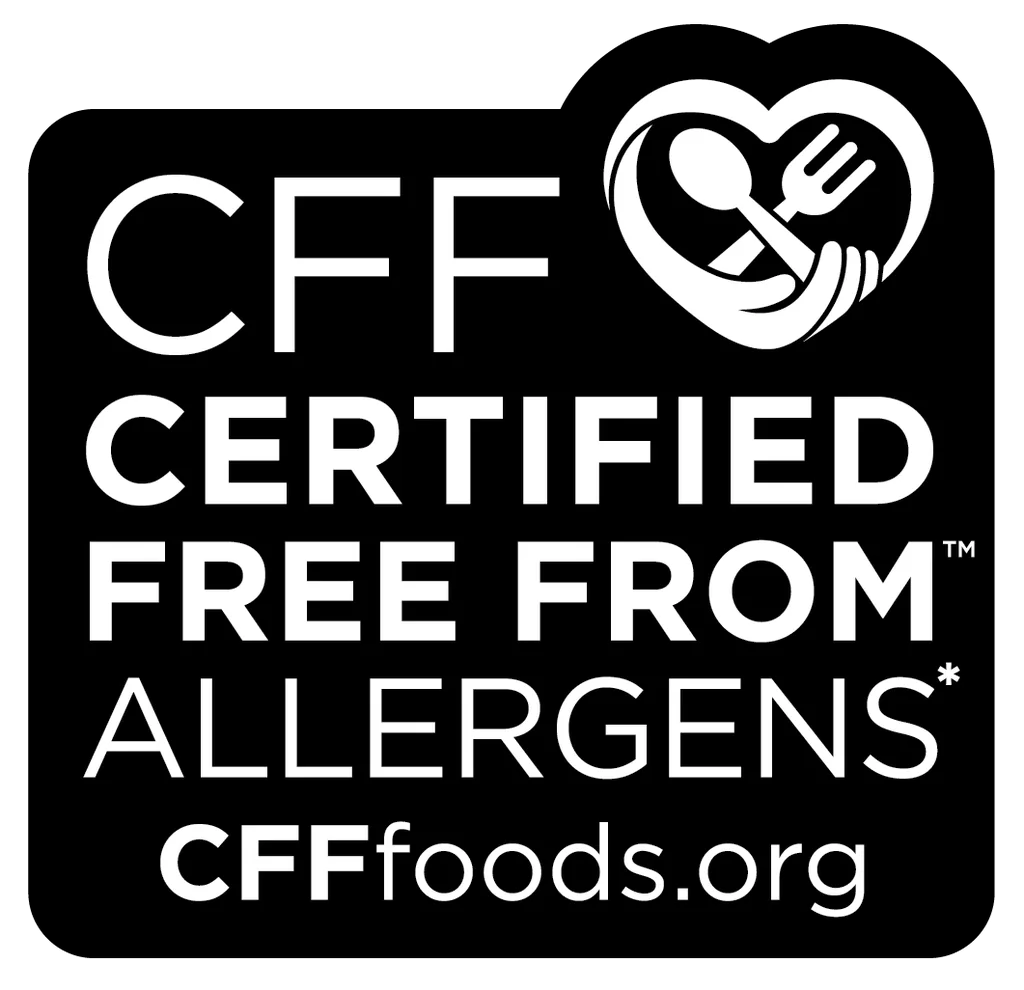
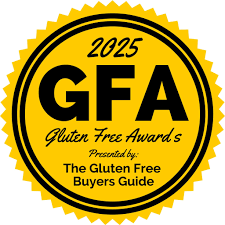
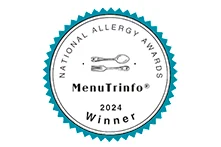
I have been trying for years to find out if Buckleys cough syrup contains gluten or not. I’ve contacted the company multiple times and they just refuse to answer the question. Does anyone know if it is safe to use???
Hi Paula, my rule of thumb with any manufacturer who won’t disclose whether their product is gluten free is to simply avoid it.
Either they don’t know — which is concerning — or they don’t want to disclose it because they DO know and that’s also concerning.
Either way, they’re not trying to earn our business as gluten free consumers if they’re not being forthcoming with information that we need to make choices required for our health.
~jules
I still don’t know if regular strength Robitussin Cough + Congestion DM contains gluten. I have a bottle of it and a terrible cough and don’t know if I can take it… help! 🙁
HI Tracie – did you end up calling the company directly about the specific product you have? That’s always the best place to start! If the customer service can’t provide an adequate answer, then I take that as my answer — not safe! Hopefully by now they are trained well enough on gluten to handle these calls though!
Mullein is also excellent for producing Cough Syrup, specifically for dry coughs. It possesses a soothing demulcent for the respiratory system. ‘Demulcent’ means a herb wealthy in mucilage that is soothing and in this situation is also delightful!.When you feel the leaves of Mullein they really feel wonderfully soft and silky which is a certain sign that the leaves have mucilage. Mucilage, although it sounds disgusting, is excellent stuff as it coats and protects mucous membranes lining the gut and respiratory system…
I have to wonder if some who are reacting to “corn gluten” containing products are in fact allergic to the corn itself. It’s not uncommon and we are bombarded with corn additives these days. Too much of any one ingredient is bound to cause trouble for some.
Jules, please reword the end of your article, I think you’re confusing your readers. My recommendation:
“So, according to Pfizer, whether it makes sense or not, ONE of their cold and cough medicines contains corn gluten:Robitussin® Peak Cold Maximum Strength Cough + Chest Congestion DM, but none of their medications contain wheat gluten.”
It is even tougher if you have soy, dairy, egg and other concurrent issues. An ER doc told me that many prescription meds..especially any in white tablet form…can have gluten, soy, dairy or egg. Getting inserts they give just to MDs sometimes helps..almost impossible to get the company to tell you the truth..pharmacies often don’t know. But when I tapered off/dropped assorted asthma meds he warned me about, 99% of my allergic responses ceased..along with the proper diet of course! Now we use prevention and rarely get sick…extra vitamin D, silver, fresh juicing, etc.
Liza – that’s such a testimonial to a healthier life! If we could all aspire to/try to get off medications … I wonder what other problems might disappear! It’s so amazing the difference the right diet makes, but if you’re still getting “glutened,” or small amounts of other food allergens are slipping through in your medications, you can never reap the full rewards of a healthy life. Thank you so much for sharing your experiences!
I just called and they told me that Robitussin® Peak Cold Maximum Strength Cough + Chest Congestion DM does NOT contain gluten.
Now i’m really confused. And still coughing. Out of an abundance of caution, I’m not taking it.
Stephanie, first off, so sorry you’re feeling terrible! I guess cold & flu season really are upon us! Secondly, I really don’t think they know what they’re talking about, because I’ve never heard of an instance of corn syrup containing wheat! That being said, some folks have reported that they believe they were glutened by this product. Additionally, when companies don’t seem to know which way is up with regard to gluten and contamination, my recommendation is to steer clear. There are plenty of other safe choices. Feel better soon!
Vicks Nature Fusion is gluten free and alcohol free. They are heavily advertising this right now, so watch your Sunday papers for coupons!
Thanks so much for the info, Steve!
They appear to have canceled this product. It is no longer on their website and I cannot find it in any local pharmacies anymore.
Corn syrup, maybe she’s referring to corn gluten.
If it was made with wheat, it would have to be on the label because of the food labeling law. Did you check with the American Celiac Disease Alliance on this?
J Lengerd – that’s exactly what I asked! In fact, I asked so many questions (including, “Are you talking about corn gluten?”) that the representative had to call me back after she talked to supervisors and got more information. I am just reporting what they told me which, as I said, makes no sense. You are correct that it would be highly bizarre for there to be wheat in the corn syrup, however, the labeling laws for medications are different than for foods (in terms of reporting). The fact of the matter remains that the company itself is no proclaiming that there is gluten in three of their products and I have now heard of at least 2 people who are reporting they have been “glutened” and they are attributing it to these medications. We need better regulations of inactive products in OTC and prescription medications. Period.
Lengerd, there is no law that states that medicines (OTC or prescription) have to state any allergens on their ingredient labels. There are people trying to get this law changed (including Steve Plogsted).
Hi Jules,
When I got Pat’s 1st email, I didn’t do anything because I didn’t have a source. A 2nd email w/details went out later. And although it’s just a few kinds, a few kinds is a huge deal! I recommend glutenfreedrugs.com to gobs of people, but it’s also logistically impossible to be on top of every change made on thousands of meds. I do think the emails serve a great function…as long as details are double checked.
And thank YOU for calling & posting!
Thank you for the info. When ever my daughter gets sick I usually give her that childrens Robitussin. She has never had a reaction from it. Im curious as to what is in it.
Lorraine, apparently & unfortunately, they just reformulated this product.
What is the ingredient that contains the gluten? And why only 3 of the many products?